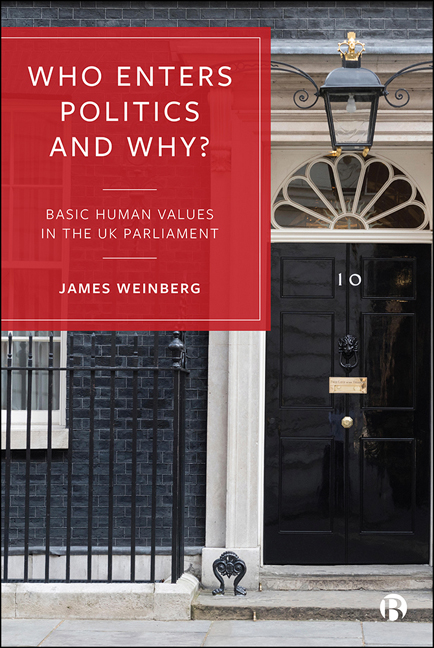Book contents
- Frontmatter
- Dedication
- Contents
- List of Figures and Tables
- Note on the Author
- Acknowledgements
- 1 Why Do We Hate Politicians?
- 2 Psychological Scrutiny: Who Enters Politics and Why?
- 3 All the Same! Demographic Homogeneity and Careerism
- 4 Basic Values and Partisanship
- 5 Parliamentary Behaviour: Personal Choices, Political Results
- 6 Perfect Politicians? Voting Preferences in the United Kingdom
- Notes
- Appendix A Twenty Item Portrait Values Questionnaire (TwIVI)
- Appendix B Confirmatory Factor Analysis of Survey data on the Basic Values of Politicians (UK Members of Parliament, N = 168)
- Appendix C External Correlations Across Samples
- Appendix D Conjoint Experiment of Candidate Preferences by Partisanship
- References
- Index
3 - All the Same! Demographic Homogeneity and Careerism
Published online by Cambridge University Press: 12 March 2021
- Frontmatter
- Dedication
- Contents
- List of Figures and Tables
- Note on the Author
- Acknowledgements
- 1 Why Do We Hate Politicians?
- 2 Psychological Scrutiny: Who Enters Politics and Why?
- 3 All the Same! Demographic Homogeneity and Careerism
- 4 Basic Values and Partisanship
- 5 Parliamentary Behaviour: Personal Choices, Political Results
- 6 Perfect Politicians? Voting Preferences in the United Kingdom
- Notes
- Appendix A Twenty Item Portrait Values Questionnaire (TwIVI)
- Appendix B Confirmatory Factor Analysis of Survey data on the Basic Values of Politicians (UK Members of Parliament, N = 168)
- Appendix C External Correlations Across Samples
- Appendix D Conjoint Experiment of Candidate Preferences by Partisanship
- References
- Index
Summary
‘[W] e’re so keen to find fault – not just with our politicians but with our political system – that we very frequently forget, as citizens, that democracy is what we collectively make it. Casting stones at politicians, and diminishing the importance of the democracy in which we live, ultimately damages us all.’
Labour Party MP (Interviewee 16)The personalities of politicians are playing an ever more prominent role in political leadership, debate and communication around the world. This was particularly stark in both the US presidential election of 2016 and the UK General Elections of 2017 and 2019. In 2017, for example, the media compared the main candidates for Prime Minister as much on psychological characteristics as physical ones; the ‘robotic’ yet ‘decisive’ Theresa May was contrasted with the ‘principled’ yet ‘weak’ Labour leader Jeremy Corbyn, and these terms stuck in the popular psyche (YouGov, 2017). At the same time, studies of elite personality in politics have been severely limited by at-a-distance methodologies and, in political science in particular, a reluctance to cross disciplinary boundaries (see Wyatt and Silvester, 2018). The previous chapter assessed the ways in which politicians, at an aggregate level, differ psychologically from those they govern. Data collected from 168 national MPs and 415 councillors show that politicians are unique in terms of their basic values; that these differences make an additional contribution to the effects of well-researched socioeconomic and demographic factors in determining who enters politics; and that basic values also distinguish between those MPs who reach the highest political offices and those who do not.
This chapter now builds on these findings to interrogate how such differences might or might not manifest at a subgroup level. To do this, the elite sample is split by gender and then ethnicity, and in each case MPs are compared to corresponding groups in the general population using the eighth round of the European Social Survey (2016). A series of factorial analysis of variance (ANOVA) models is used to assess the extent to which MPs are more or less similar to one another in their basic values than their ‘descriptive’ sub-populations. The final section of this chapter then focuses on a socioeconomic trope common in evaluations of politicians by examining the differences between career politicians and those without prior employment in politics.
- Type
- Chapter
- Information
- Who Enters Politics and Why?Basic Human Values in the UK Parliament, pp. 53 - 78Publisher: Bristol University PressPrint publication year: 2020



